‘Under the Whispering Door’ book review: An immersive experience
Often, whatever it is that you claim to value—family, friends, pets, books and other little things that spark joy—are relegated to the end of your priority list as your workload increases. Caught up in the rat race your days merge into one another and you run the risk of letting life pass you by. Klune focuses on this theme and tells interesting stories, making you think about all that you take for granted. I loved ‘The House in the Cerulean Sea’ and I picked up ‘Under the Whispering Door’ because I just knew this one would also be amazing. Klune’s writing is extremely nuanced and witty as well.
Under the Whispering Door is a whimsical fantasy novel about a man named Wallace Price who dies and becomes a ghost. But Wallace wasn’t done living. He had too much work left to do. As Wallace struggles to cross over to the afterlife—floating around in the teashop run by an empathetic ferryman called Hugo—he finally learns how to live. Cold, calculating, and cantankerous, Wallace wasn’t a very likable man when he was alive. He never realized the extent of damage he did to people around him. But death humanizes him, makes him realize there is no difference between him and the next person and that life doesn’t necessarily have to be about beating other people to get to the top. Kindness, Wallace learns albeit a bit late (or is it ever too late?), can (and does) go a long way. And if not in life, then in afterlife, he is determined to make it his guiding principle.
Klune has written a beautiful story of redemption after death that brims with witty one liners and scenes you want to go over again and again. There are many fun characters who never let the story get boring, even when there’s not much happening. Mei is a passionate and smart reaper who makes you double with laughter with her sarcasm and knife-wielding threats. Hugo’s grandfather, Nelson, is another ghost like Wallace who has been hanging around the tea shop for years. He teaches Wallace ‘how to be a ghost’ and scares visitors he doesn’t like at the teashop. Then, there’s the Manager who everyone fears and wants to avoid. His imminent arrival creates a tension that keeps you at the edge of your seat.
I must mention the cute love story between Wallace and Hugo (no, it’s not a spoiler). It’s very organic and doesn’t feel forced like many narratives where romance isn’t the primary focus. Klune, who is gay, makes sure there is good queer representation in his stories. Reading his books, I believe, can help create a positive image of the LBGTIQA+ community. Though Under the Whispering Door is a fantasy novel, it’s highly relatable and helps you better understand yourself and those around you. Definitely a must read.
Four stars
https://www.goodreads.com/en/book/show/53205888-under-the-whispering-door
Fantasy fiction
Under the Whispering Door
TJ Klune
Published: 2021
Publisher: Tor
Pages: 376, Paperback
“Bachchhan Paandey” movie review: A pandora of disappointments
I had read somewhere that the recent Akshay Kumar starrer “Bachchhan Paandey” had failed in the box office. But filmmakers and fans alike blamed the unexpected success of “The Kashmir Files” as the reason BP could not do well in cinemas across India and abroad. Also, the IMDB rating for the 2022 Hindi-language action comedy is 7.1 out of 10. Not bad, I assumed, for a relaxed evening on Amazon Prime.
But only around 20 minutes in, I was sure I’d be getting the biggest disappointment of the year in terms of films. Directed by Farhad Samji, BP takes inspiration from two amazing films—the 2014 Tamil “Jigarthanda” which in turn was inspired by the 2006 South Korean hit “A Dirty Carnival.”
Having watched both, I’d first like to make it clear that BP does not even scale to a quarter of the greatness of its inspirations. In fact, this film makes the audience question the judgements and choices of actor Akshay Kumar and producer Sajid Nadiadwala, both successful men of Bollywood who seem to have suddenly impaired their tastes and skills.
The film begins with opening credits and background music that seems to be inspired by the OSTs for Clint Eastwood’s classic “Dollars Trilogy.” The music is not impressive but does definitely grab some attention. And that’s the only likable part of the film. The rest is just a collection of some of the worst performances in Bollywood history—both acting and production wise.
The titular character Bachchhan Paandey (Kumar) is a ruthless gangster based in Baghwa, Bihar. His exploits are not only famous in the region, but also reach the ears of Mumbai-based aspiring filmmaker Myra Devekar (Kriti Sanon). Myra has been told by her producer to find a real-life gangster as an inspiration for her movie and she travels all the way to Baghwa to research him.
Then follow a series of goof-ups and bizarre sequences as filmmakers try to humanize the cold-blooded murderer Bachchhan Paandey and make him a ‘hero’. This age-old villain-turns-hero narrative is so bluntly inserted into the film, it gets boring from the word go.
The problem with Bachchhan Paandey is, it tries too hard to emulate mainstream South Indian filmmaking where the characters are loud, colorful and atrocious. Kumar’s titular character is a stereotypical baddie who has a dramatic secret that justifies his present behavior. But the actor is never comfortable in his character. It seems obvious that the veteran actor is trying too hard to fit into a role he would have pulled off easily a decade and a half ago. Plus, his attempted Bihari accent sucks.
Talking about accents and acting, BP is one of those rare films where a bunch of celebrated actors collectively fail. Kriti Sanon is nowhere near her best. Arshad Warsi—the famous ‘Circuit’ of the Munna Bhai MBBS fame—plays Vishwakant Mhatre (Vishu), Myra’s jovial friend, sans his usual comic timing. Jacqueline Fernandez as Sophie, Bachchhan’s love interest, could have been replaced by anyone in the crew and nobody would have missed her.
The miserably writing of Bachchhan Paandey not only lets down its main characters but also causes a dent in the resumes of brilliant supporting actors like Prateik Babbar, Abhimanyu Singh, Sanjay Mishra, Seema Biswas and even the great Pankaj Tripathi who has had a good streak of hits in the near past. There is absolutely nothing interesting in any of the characters played by these actors, which is shocking. Again, there probably has not been a bigger collective failure than Bachchhan Paandey in Bollywood’s recent history.
Who should watch it?
Nobody. That’s why I am writing this review. To warn my friends and readers with Amazon Prime to skip this movie. Don’t like IMDB ratings and Akshay Kumar fans fool you into indulging in this snooze fest.
Rating: 1 star
Genre: Action comedy
Director: Farhad Samji
Actors: Akshya Kumar, Kriti Sanon, Jacqueline Fernandez
Run time: 2h 27mins
Photo Feature | Chisel, hammer and his wit
Durgesh Kushbaniya sits in the shade of a blooming Jacaranda tree by the roadside at Chabahil, Kathmandu. Beside him are stone pestles—oval, rectangular—neatly arrayed on a makeshift display stand adorned by a maroon carpet.
The 33-year-old, who hails from Rupandehi district of Lumbini Province, has been making and selling pestles and mortars here for many years. He first came to Kathmandu some two decades ago with his young wife, who is from India. The couple has three children: one daughter and two sons, all of whom go to the Pashupati Secondary School nearby.
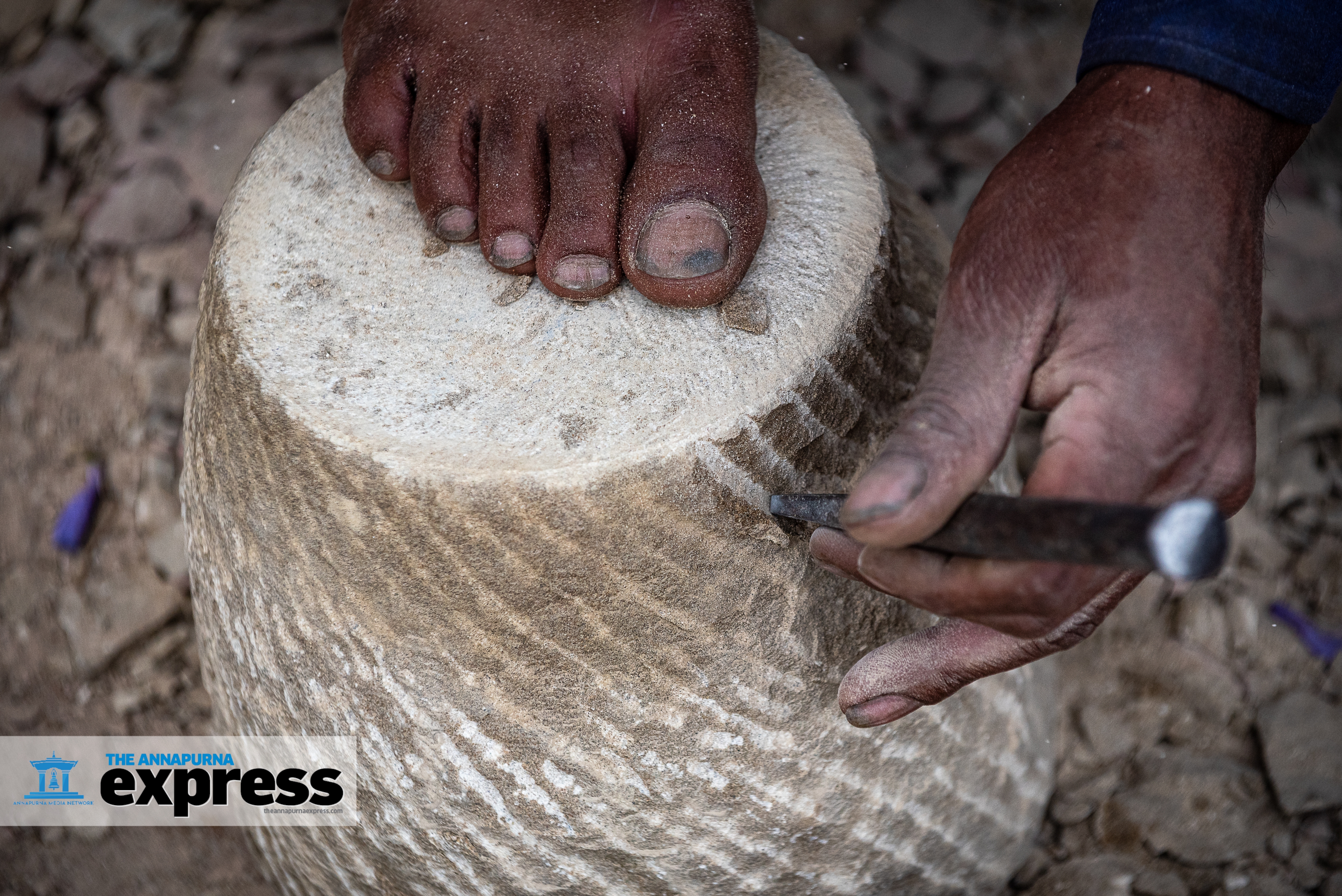
Kushbaniya says selling pestles and mortars is his only income, with which he feeds his family. He has rented a tiny room nearby. All five family members eat and sleep here.
Until a few years ago, the family used to live under a makeshift tent. Kushbaniya says he rented the new place after the municipal police of Kathmandu Metropolitan City removed the tent.
The room the Kushbaniyas live in barely fits two beds. But for the family, it is home—the only place they can afford.
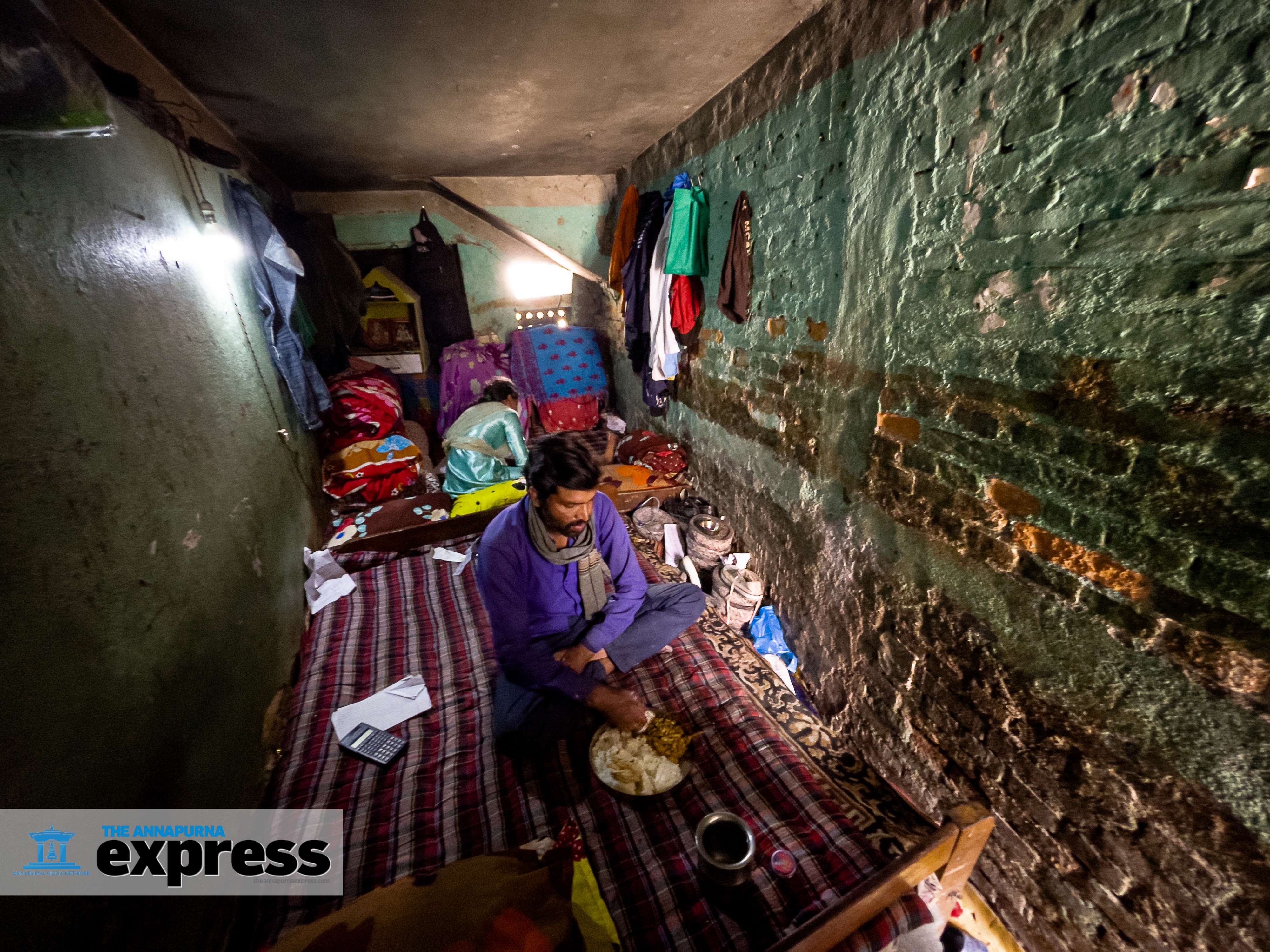
“My line of work doesn’t provide a steady source of income,” he tells me. “Sometimes I make Rs 10,000 in a day and other times nothing at all.” Still, he continues because he has no other skills.
Kushbaniya gets the stones for his products from Birgunj in Parsa district. “They have to be transported in trucks, and it is my job to turn them into mortars and pestles using my chisel, hammer and my wit,” he says. “It takes up to three days to create one pestle. Their price depends on the work I have to put in.”

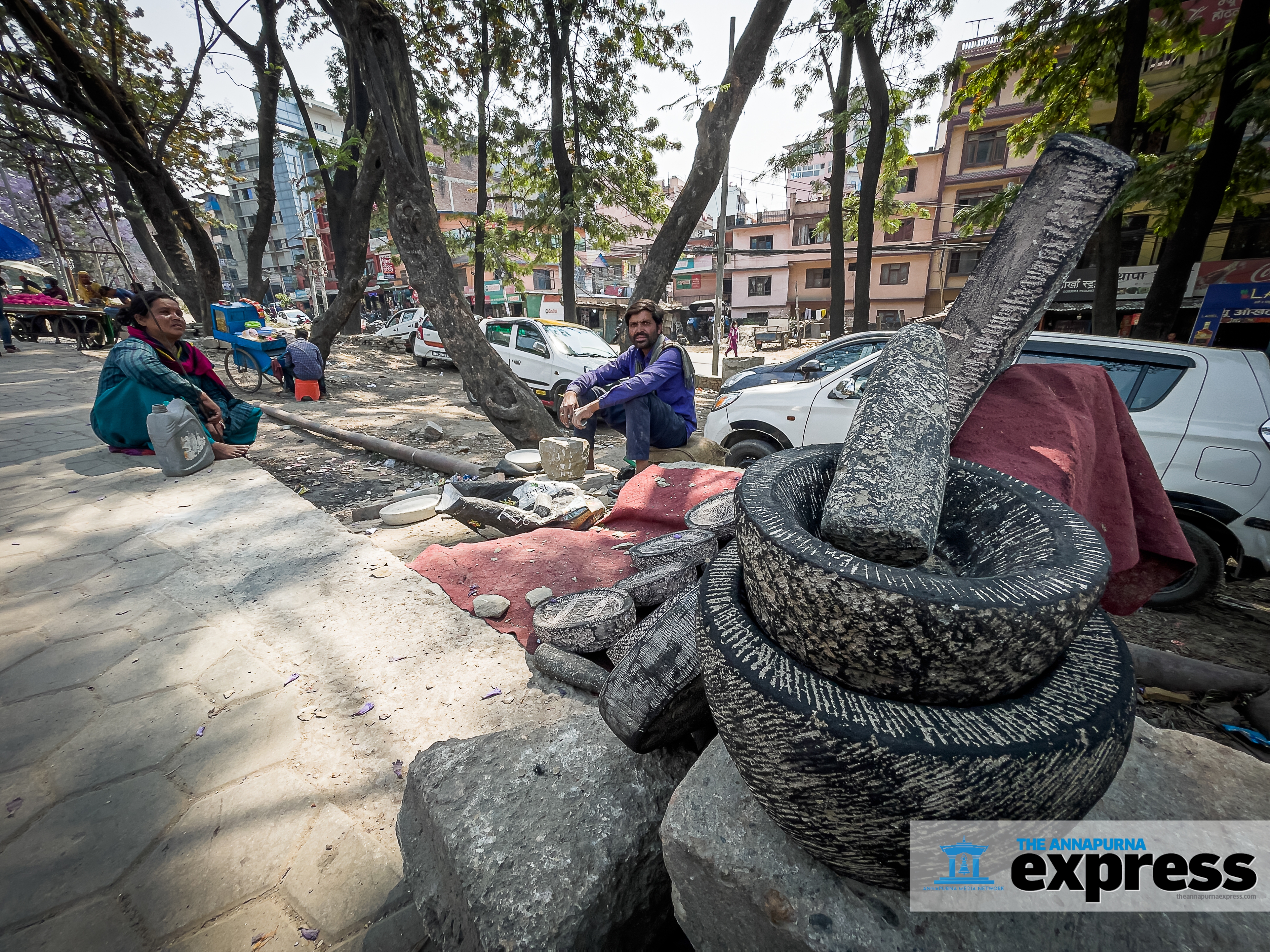
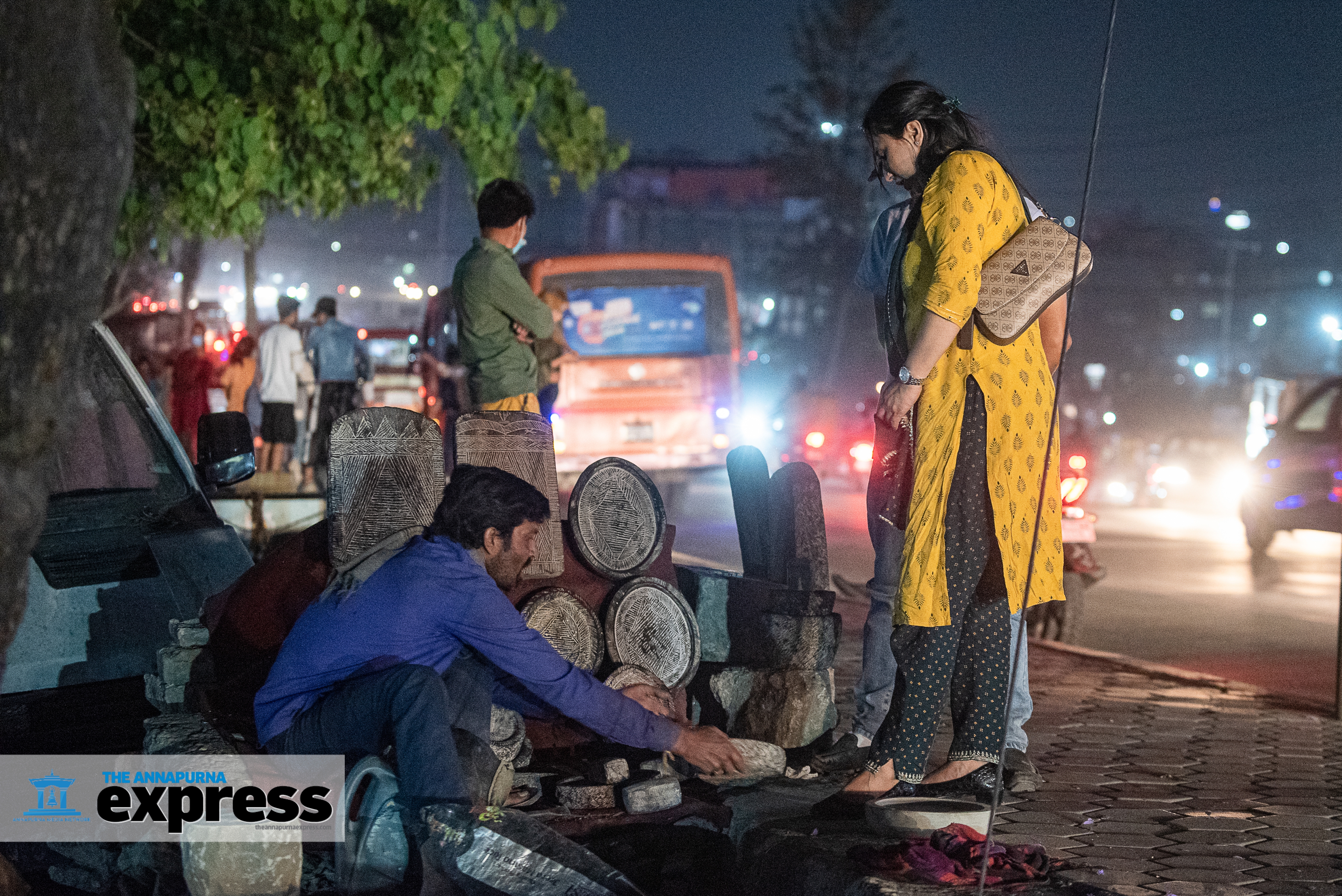
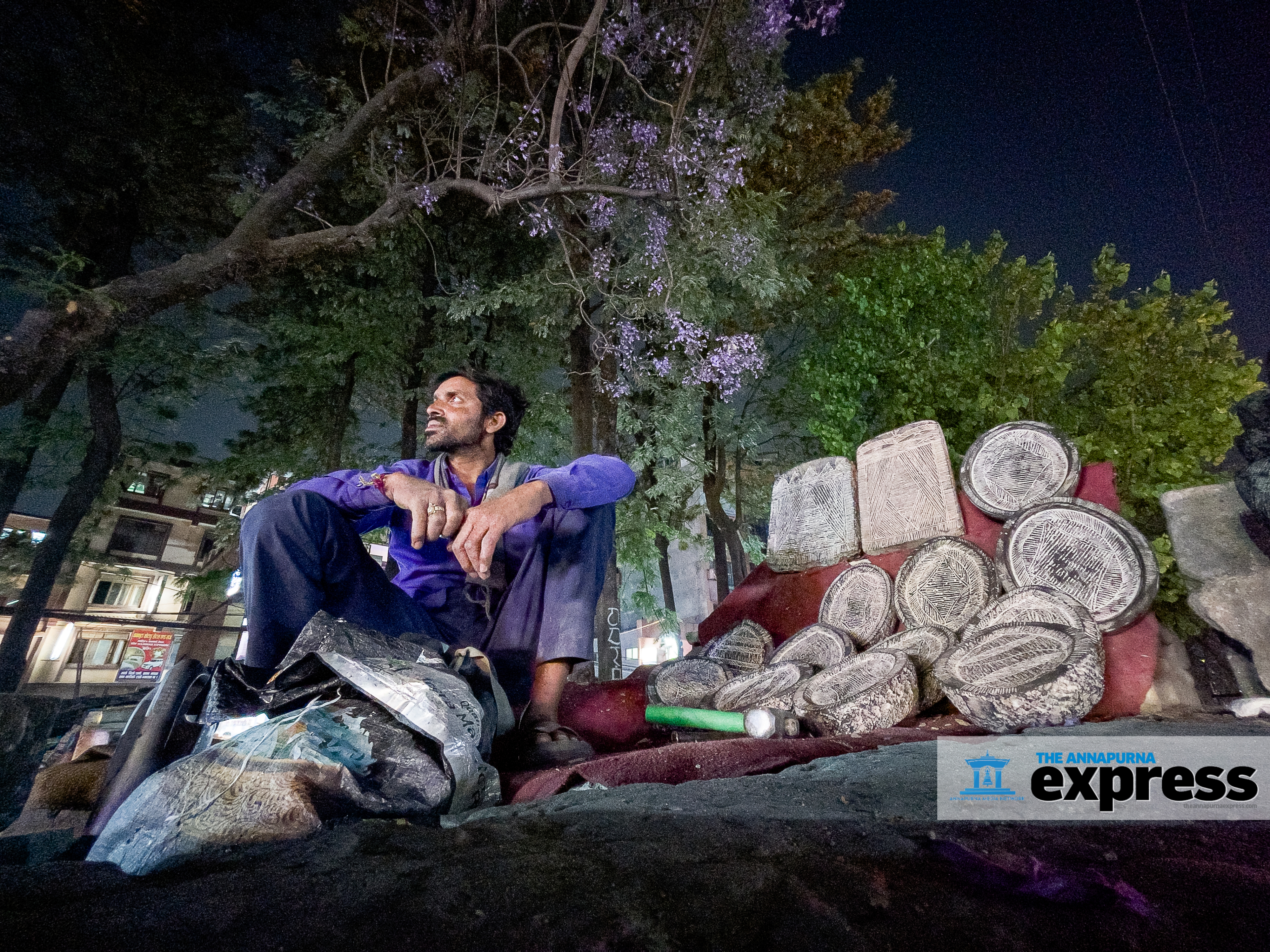
Film South Asia kicks off in Lalitpur
Film South Asia 2022, an exhibition of documentaries produced in the South Asian countries, kicked off at the Yalamaya Kendra in Lalitpur on Thursday.
The festival will showcase 71 films that were selected from more than 3, 000 submissions.
The films will be screened for four days, the organizer said.
As many as nine documentaries will be screened on the first day of the festival.
Likewise, 23 documentaries will be screened on Friday while 19 and 20 documentaries will be screened on Friday and Saturday respectively.



















